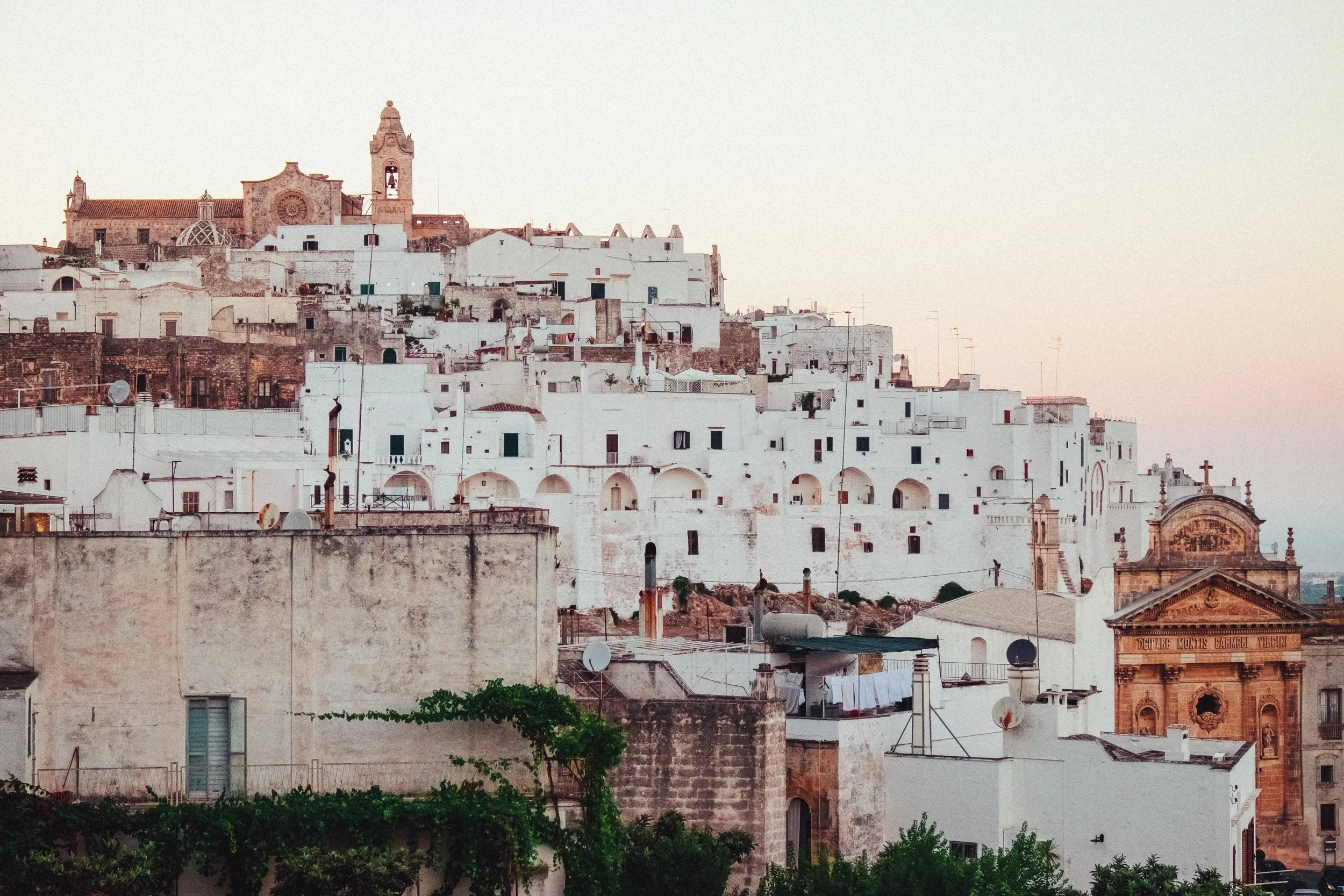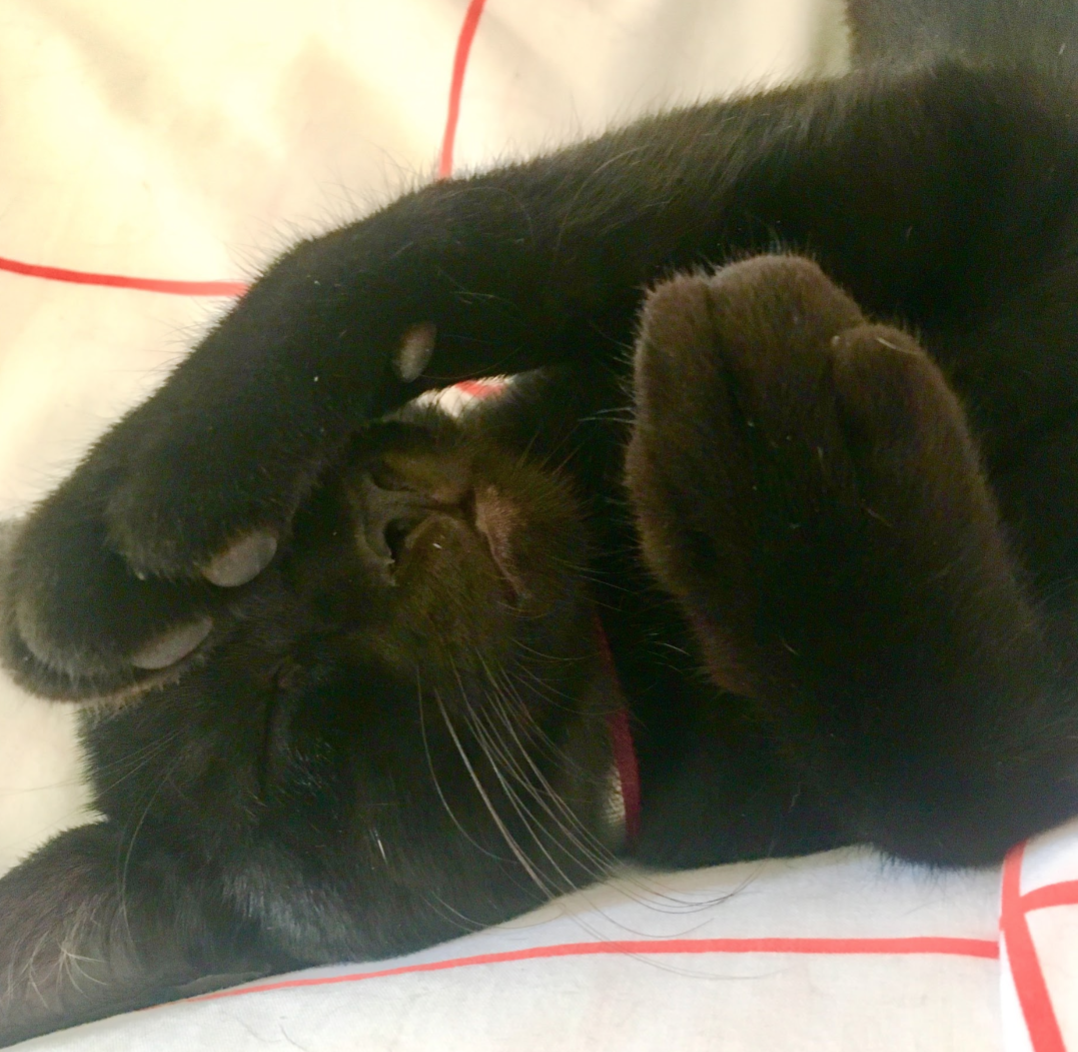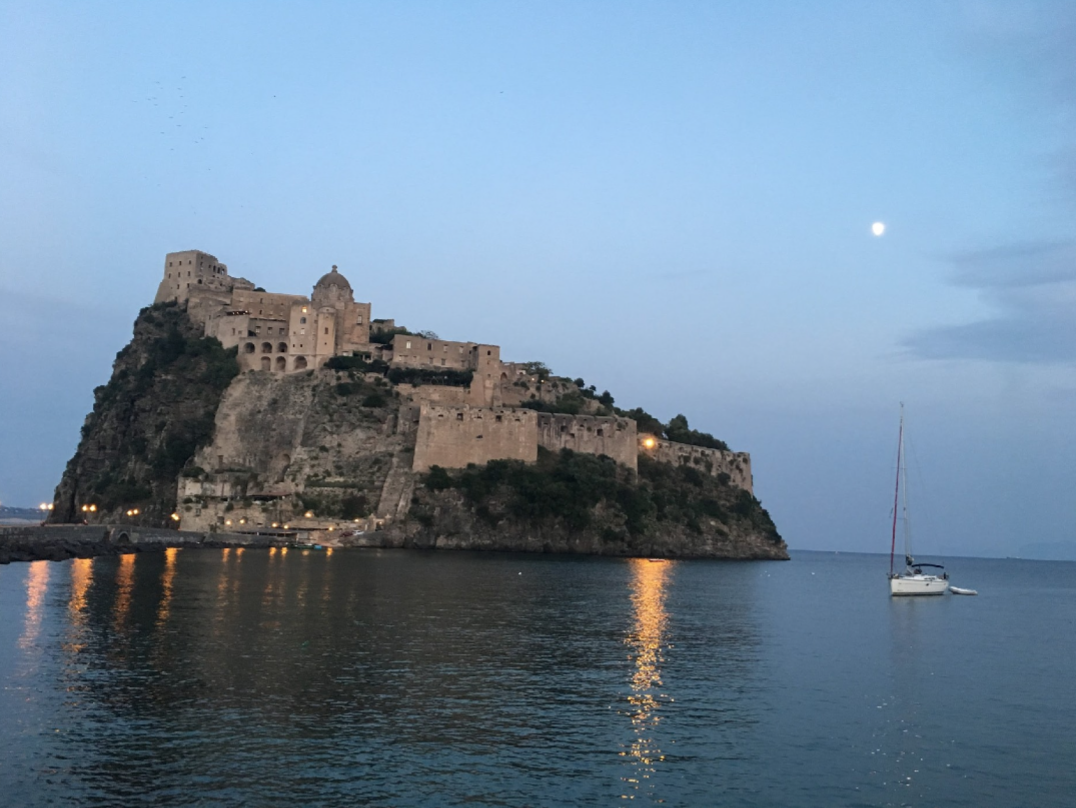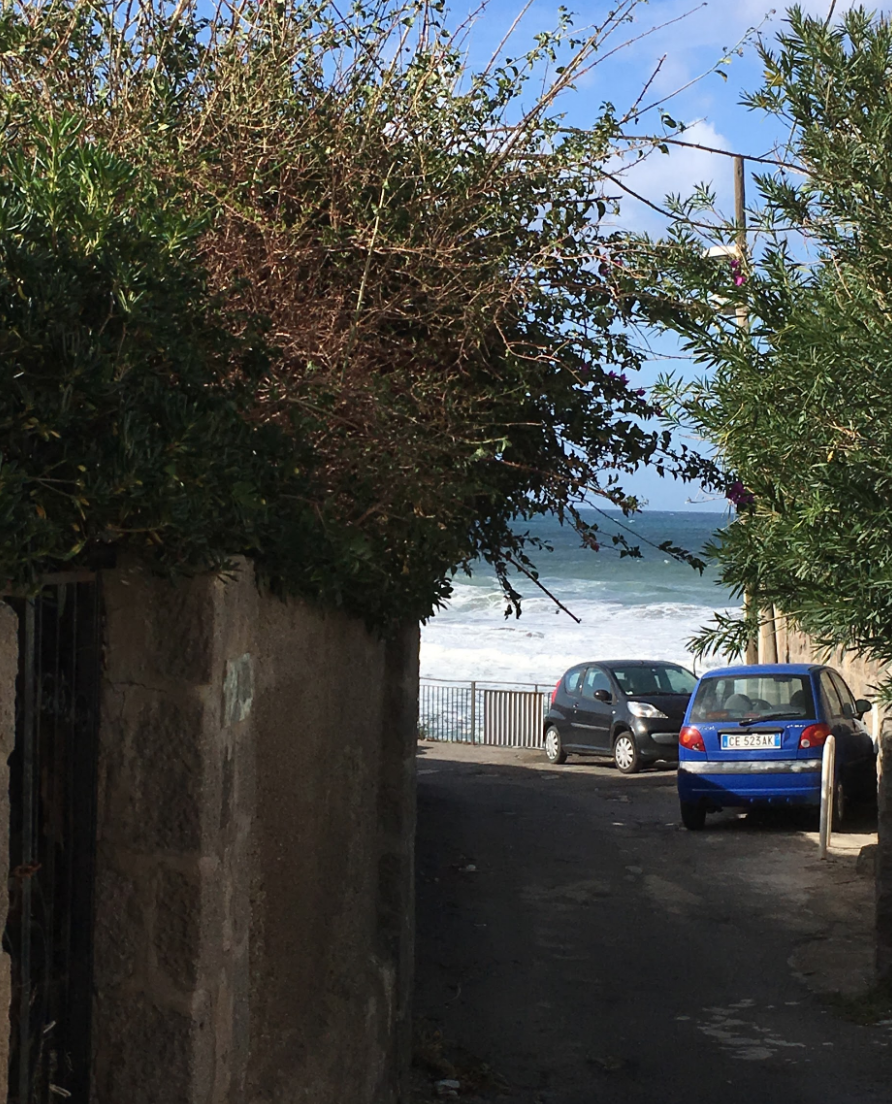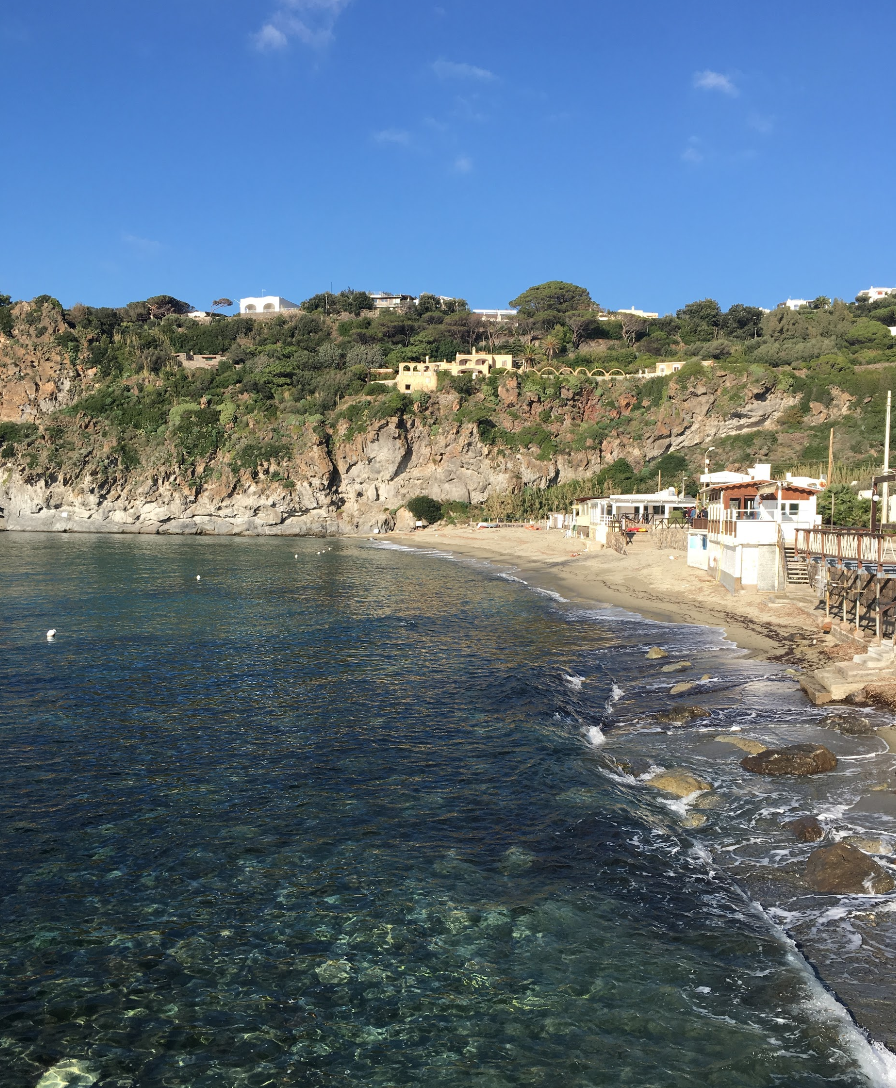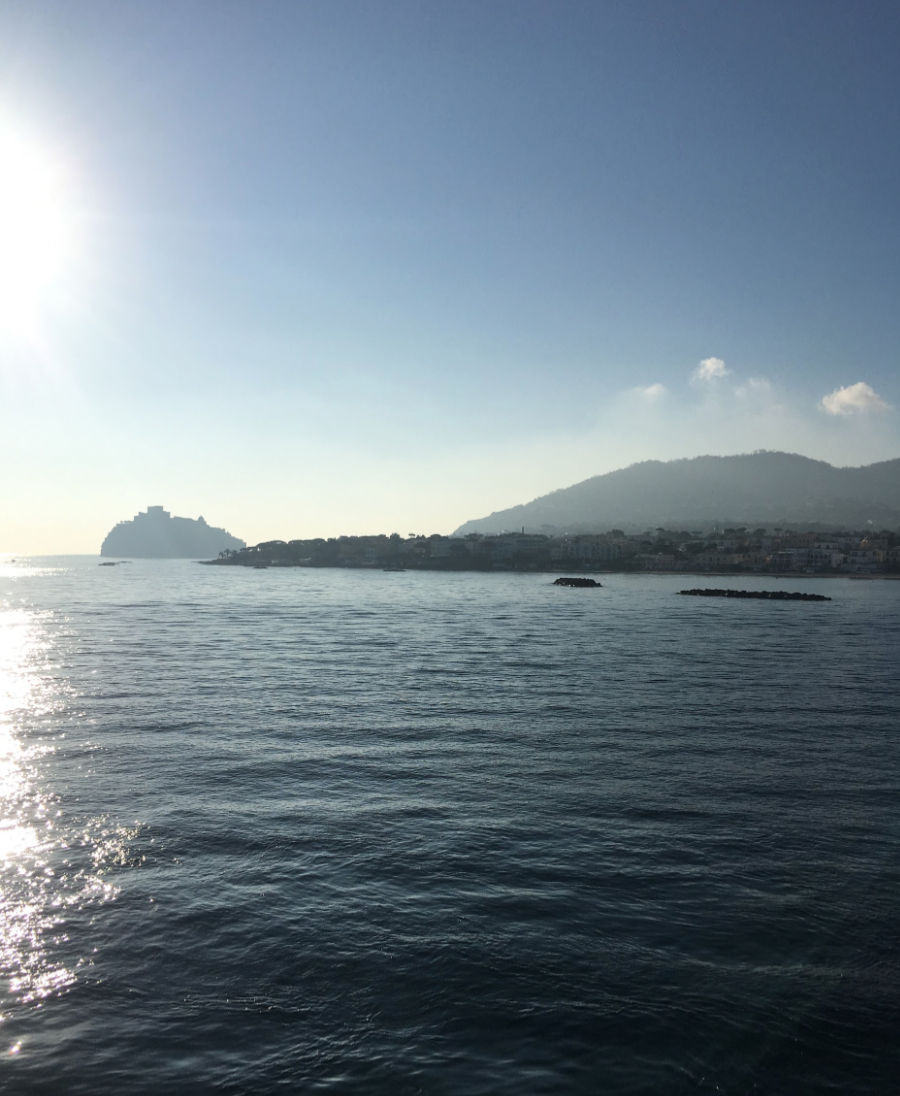by VI KHI NAO
in conversation with GIOVAN COPPOLA
VI KHI NAO: Will you depict the landscape of Ischia. What is it like today?
GIOVAN COPPOLA: I’m looking out the bedroom window and I see a sliver of the sea between the trees. The sun is setting and the clouds are bathing. And the wind has started. Tomorrow it’s supposed to be windy. I wish I could tell you which wind it is, but I’m still learning their names.
VKN: The way you lovingly and lyrically depict this filled my heart with love for your Ischia. If you were to invent a name or two for that wind, what would you call it? Also, if you had an ideal poet life, what would that writing life look like?
GC: I remember you once told me that ‘eloigne’ was your favourite word. Wait, I don’t think that’s the right word. Do you remember it?
VKN: Eloign. Without the “e”, but I prefer your invention.
GC: I would name the wind Eloign.
VKN: I noticed that you were reading Rabbit by Sophie Robinson, which recently came out. How is it so far? Will you talk about the current landscape of the poetry world? You have read internationally from Brit lit and American. What do you think make a poet great in this Brexit, Trump era? What are some of the criteria or traits for such poets? In other words, what kind of linguistic or lyrical materials seduce your soul the most?
GC: I’ve loved Sophie Robinson’s poetry for a few years now. Her poems make me feel like it’s morning and I’ve just woken up and realised that something has happened to me during the night that has changed everything. Like during the night I was lassoed and pulled to a group of stars that have pumped their gumption into me and I will now become a better braver person in the waking world. Her poems have fish bone teeth and crime. They break open the pain and make something new.
Second question: I don’t know what makes a poet great in this Brexit - Trump era. A poet that keeps writing, keeps wanting to know, I guess. A poet that keeps loving. A poet that takes care of herself and the winds.
Third question: What materials seduce my soul? Poems that live where they want to live. Poems that make room. Poems that love things.
VKN: That is so gorgeously depicted “lassoed and pulled to a group of stars.” She is so lucky to have you as a reader ! If you were to interview her, what would be one question you would like to ask?
GC: Once your poems pull through the pain, where do they lay down their heads?
VKN: Can you talk about the poems or any translations you are working on? What is the process like for you? And, what direction do you foresee your own journey with your work? Would you like your process to be more accelerated? Where it infuses everything you touch and cook?
GC: Thank you for all of these questions, Vi. They inoculate me.
I recently came back from FILL, the Festival of Italian Literature in London, and I did a reading with a group of poets. We were all included in the anthology Wretched Strangers (Boiler House Press) as non-UK poets who contributed to the poetry world in the UK. The anthology was put together in response to Brexit and the current political upheaval making way for powerful responses from the far right against refugees and immigration. Four of the poets that read were non-native English speakers writing in English and also mixed in other languages into their English poems. And I thought how wonderful that was and wondered why I didn’t think I could do the same in Italian? It made me think about how the English language can be a symbol of progress. That you learn English, you move to an English speaking country, you transform yourself in a different language. What does that mean about me moving back to Italy where my parents have come from? Would me writing in Italian be seen as progress? Or is it pedalling counter-clockwise? Or is it turning into a seed?
I want to write in Italian or mix English and Italian. I think my poems, at least when I read them out loud, sound tough, like hard cheese rinds before you throw them in the soup. And my New York accent comes out. <dawg> I’d like to see what happens in Italian. I’d like to dissolve in Italian. I don’t think I’d have to dismantle anything, but I think it means when I go for walks I would have to push myself onto people. Linger and talk to them. Even to the Jehovah Witnesses, although I don’t want to talk about Jesus.
You know one thing I noticed that I really liked? When I was in London for the Italian Literature Festival, I sat next to a lady. She was an academic that studied post-war Neapolitan literature written by women. At one point she gave me a candy. A few days later, I took one of my cats to the vet and the vet offered me a gummy worm from a bag. I really love eating candy with Italian women.
VKN: I want to eat Starbursts with Italian women too !What are the poets you read with were like? Are they different from you or similar? Will you introduce us to a few great Italian poets that everyone must read or else their existence on earth would seem meaningless otherwise?
GC: The poets I read with at FILL were really diverse. I wish I could have talked to them more or asked more interesting questions during the Q&A, but I suspect like many people, I’m always shy after readings and there doesn’t seem to be enough time to calm down afterwards and talk. I wish after a reading there was always dinner. Food disarms people and makes people trust each other. You can’t take yourself seriously when you have food in your mouth. Like eating candy with people. The next poetry reading I’m going to bring candy.
But yes, some Italian poets I really love and that I’ve got to meet during poetry readings or have been recommended to me are Carla Mussi, Roberto Minardi, Alessandro Mistrorigo, Chandra Livia Candiani, Alessandro Burbank, Andrea Inglese, Giovanni Asmundo, Fabia Ghenzovich, I want to know so many more.
VKN: I am not familiar with these poets. Will you please give me a little introduction to one or two poets you mentioned? Are they contemporary? Old-fashioned? Dead? Alive but obscure? Alive and gregarious? Dreadfully enticing in their form, but wouldn't take a dog out for a walk?
GC: They are alive and contemporary, some I’ve met, some I’ve just read. Some are young and shy and delicate and others are robust in their sexuality. Some are travelers and some like to stay home. There are so many people to know about and read! I’m still learning about what’s out there and letting things carry me to where they want to go. Carla Mussi’s latest book of poetry is Sconto di Pena (Puntoacapo, 2016) roughly translated as ‘Reduced sentence’ and it’s about a murder trial of a woman who has killed her husband from the woman’s point of view. Each poem is like a holographic statement, phrases that cut, the woman is like a genius wild animal.
Then there are Roberto Minardi and Alessandro Mistrorigo. Roberto Minardi’s La citta’ che c’entra (ZONAcontemporanea, 2015) are about living in an urban landscape. There are people, birds and cats, public transportation, sandwiches and dinner in front of the television. The poems give you a perspective of solitude where many things happen. Roberto and I have translated a few poems for each other which was really fun. That was my first time translating poetry and he was lovely to work with, encouraging and patient. Alessandro Mistrorigo’s Stazioni (Ronzani Editore, 2018) were written in various places across Europe and Asia. Characters that all come from somewhere else, temporary people and places and it makes me think about how we become a place, how we can blend into the space around us. Reading the poems reminded me of the Alexandria Quartet by Lawrence Durrell.
VKN: What was life in UK like for you before you moved back to Italy? Do you miss the poetry landscape there? And, if you were to create your own here in Italy, a poetry club, what kind of baking or culinary dishes would you make to seduce those who already love the sea to consistently come? Would you ever run or host a regular reading series?
GC: I loved London for many reasons and I loved the poetry landscape there. I met many poets and writers and there were many writers that would pass through to give readings. All kinds of readings to party style reading slam poetry jams to sit down quiet readings to poetry as performance art to elevated academic readings to rock concert style readings, so many kinds so you didn’t have to feel like every single one of them had to have a meaning. I mean you didn’t feel the pressure to have a great time or to even listen. It was okay to be bored because you were still going to get something out of it.
I miss that, but not enough to go back. I like it here and I want to hold dinner party poetry readings in the garden. I want poets to come over and eat and read poems. How do I invite people that don’t know me to come over and eat? A no-pressure environment. If they want to, they could use big words and talk about the PhD they’re working on. And they could also talk about how many times a week they wash their hair. I’d like to read poems where anything can happen and I want to read poems that change you. I want to eat things while reading poems.
VKN: The question you asked Sophie R earlier in our interview, if you were to answer that question on her behalf, how would you reply to it? I don’t know if she would mind, but let us pretend that she wouldn’t.
GC: I think her poems rest on her cat and they watch television together. Maybe her cat is a little wheezy and the poem who has done all the heavy breathing in the lines, can now show her cat how to slow down. They teach each other about the aftermath.
VKN: You are a cat lover. This is obvious on your Instagram posts. Do cats make great poets based on your observation of them? Or they make better ice cream, left too long in the sun and they would melt.
GC: I don’t think cats melt. They imitate their dry little turds in the sand. I think cats are spectacular poets. Have you read The History by Elsa Morante? There is a character Usepe, who is a little boy that suffers from epileptic seizures. He’s a little boy and he’s a poet and he doesn’t write them down, he just says them. Shouts them into the air. He talks to the trees and tells them a poem or tells the river a poem. He’s a lonely boy. I think cats are like Usepe. They say the poems, but it’s not necessary to preserve them. I think that’s why wherever they are it feels like home. That’s why they make home feel like home.
VKN: If you have a dish you made that looks like a walking example of poetry, will you share that pic with us?
GC: Good question. Let me check the files.
I have to find a picture of it, but maybe I didn’t take the picture of what I have in my mind. I made roasted tomatoes over the summer that I loved. I had bought an electric oven because my gas oven is shit. So the tomatoes were the first thing I made. I think I roasted them for two hours. I set up the oven in the garden so it wouldn’t heat up the house. I sliced the tomatoes, sprinkled fresh thyme on them, some salt and olive oil and then I put them in the oven. I sat in the kitchen while they roasted outside, keeping an eye on the cats in case they toppled over the oven. They were still kittens then and I anticipated constant trouble. I wore a green striped house dress and sweated my guts. The tomatoes were delicious. Carmelised. I put them on top of bread.
VKN: You take amazing photographs, Giovan! And, I just want the world to see through your eyes. Will you share one that you are able to access? So that we have some sense of your aesthetics?
GC: Let me look for one. What would you like to see?
VKN: Photos of Ischia? Or places you went for your morning, afternoon, or evening walk? Maybe some pictures of your cats, languishing like supermodels?
GC: See below
VKN: How are your cats? Some were ill the last few times I spoke to you. Why do you think they fall ill? Which one is potentially most poetic? And, what is writing poetry for a felinic entity? If they had to work like us homo sapiens, which profession do you think they would excel in? Oraclers? Philosophers? Dancers? Bartenders?
GC: My cats are wonderful. I love them more and more every day. Indy has had a bad cough that she’s been taking medicine for. I even put her in the cat carrier, wrapped it in plastic, and stuck in a tube that steamed out a medicinal vapor. She didn’t like that. So then I decided to leave her alone and now she’s getting better. I think she got sick because I went away to New York and she got sad. All of them are poetic, some days one is more poetic than the others.
If cats had a human job, I could see Sesto as a garbage collector and have a lot of fun doing it. He looks like he’d enjoy a union. Indy would be a research scientist. Rose would be a talk show host, she loves to gossip. Mucca would be a creepy neighbour who collects cans. Pippo would be a basketball player and have a large sneaker collection.
VKN: My god! Their profession so wild ! There was one project about stinking nuns you were eagerly and excitedly pursuing. How is it going so far? Are these nuns really stinky like durians? Or different stinkiness? Is your project a collection of essays or poems? Or a combination of personal anecdotes of your post-nomadic life or something else? How would you like to work or rework on this?
GC: That’s funny you asked Vi. Now that I quit my job, I want to work on the stinking nun. My poet friend Ariadne Radi Cor, who lives in Blacksburg, Virginia is starting a writing group. It is a collection of 6 of us and we will have a monthly deadline to share work with each other and then do a skype call where we can both talk about shit and serious things. So my plan is to use the writing group to work on the stinking nun and let it be whatever it wants to be. Right now it’s like a poetic novella, but I’d like to write some parts in Italian and see what happens.
VKN: You have made so many life-altering changes in the last year or so, can you talk about the emotional thoughts or intuitive courage that drove your soul to make these transformative paths?
GC: It’s been almost exactly a year since I moved to Italy and if I remember myself a year ago, I was terrified and I ate a lot of burgers and fries. One week I ate McDonalds two days in a row and then the third day I ate 5 hot dogs for a snack.
So many emotions and so much fear. I had never been as terrified doing something because it felt like there was no way back. And I imagined all the terrible things that could happen. I felt like I was doing something I wasn’t supposed to be doing. Like I was making my ancestors angry by going back to Italy, doing the impossible, going back to live in the place that they had to leave. I could hear their voices and voices of other Italians in London, like it was a bourgeouis american expat fantasy, that my desire to live where I wanted to live was invalid.
But I kept pushing through and the burgers and hot dogs gave me temporary relief. And each step that I took, it was like someone smiled back at me. Like at the airport check in the airline person let us go through without paying for our overweight luggage. And slowly, even if there were difficult times and frustrating moments, things were okay. Neither of us were punished or yelled out or threatened to get kicked out.
But if I think about what kept me going was that I was doing what I wanted and then as soon as we moved into our yellow house, a pregnant cat showed up and decided to move in. And she had her babies. And then once my residency permit was ready (after 8 months of waiting) a little abandoned kitten showed up in the garden. And then, as soon as I decided to quit my job and work on the stinking nun, another little kitten showed up in the garden.
That cats make me feel like this is home. And also that I can’t leave that we need to take care of each other now.
VKN: You are so brave, Giovan! Thank you for sharing your process with us. If there were an omelet or a piece of fruit or a poem to depict you today or a famous actor or actress in the black and white era who could cat-ure (capture) your emotional composition today, what would that object be?
GC: Hm, let me think. Anna Magnani they say was a gattarda, meaning a cat lady, someone who loves cats. She would feed the stray cats in Rome. But she wore her scars like a dress. I’m not sure I’m as strong as her. Her fury was smoldering.
I think I would be broken clementine peels on a powder blue table today. A diaphanous dress. An eloign wind. Smack face down on the couch, lazing like wax.
VKN: You are currently in Ischia, Italy and I am in Iowa City when this interview takes place, if you could teleport one cat who could pretend to be my secretary for a day, which one of your cats would you deploy for this service? I would pay your cat naturally. One poppy or peony to his/her owner per hour.
GC: Hah! I would send you Pippo. He could help you organise your receipts.
Giovanna Coppola (New York, 1979) is a poet and writer. After living in London for 10 years, she recently moved to Naples, Italy. She has performed at events and poetry festivals in the US, UK and Italy recently including the Festival of Italian Literature in London (FILL 2018), La Palabra en el Mundo Venesia (2018) and the European Poetry Festival (2018). Her work (poems, short stories, essay) have been published in Crab Fat Magazine, The Stockholm Review of Literature, Journal 69, JSTOR Daily and in the anthologies Millets (2017, Zeno Press) and Wretched Strangers (2018, Boiler House Press).
VI KHI NAO is the author of Sheep Machine (Black Sun Lit, 2018) and Umbilical Hospital (Press 1913, 2017), and of the short stories collection, A Brief Alphabet of Torture, which won FC2’s Ronald Sukenick Innovative Fiction Prize in 2016, the novel, Fish in Exile (Coffee House Press, 2016), and the poetry collection, The Old Philosopher, which won the Nightboat Books Prize for Poetry in 2014. Her work includes poetry, fiction, film and cross-genre collaboration. Her stories, poems, and drawings have appeared in NOON, Ploughshares, Black Warrior Review and BOMB, among others. She holds an MFA in fiction from Brown University, where she received the John Hawkes and Feldman Prizes in fiction and the Kim Ann Arstark Memorial Award in poetry.































